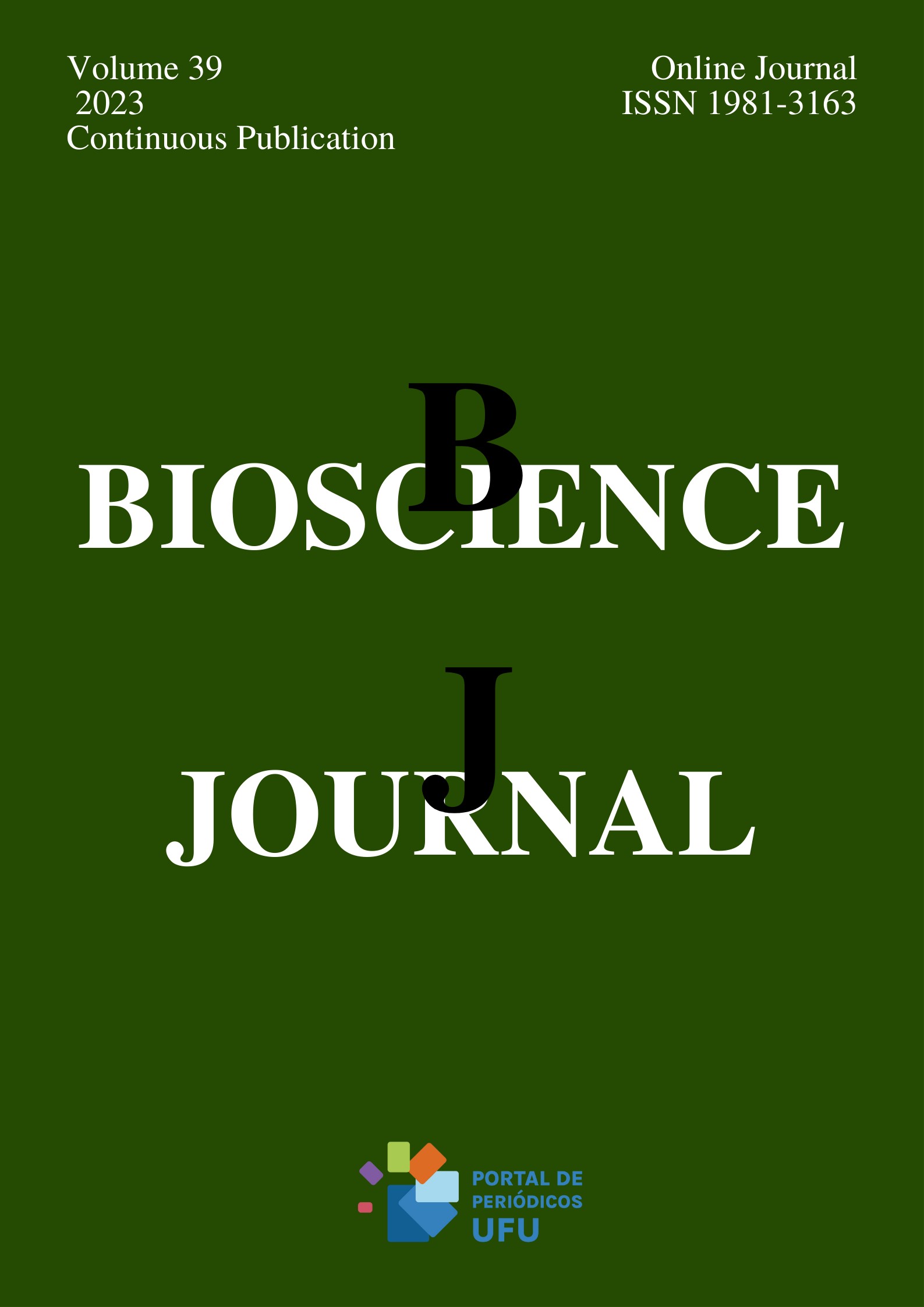Swine meat production integrated with energy cogeneration: challenges and opportunities in using anaerobic biodigestion
DOI:
https://doi.org/10.14393/BJ-v39n0a2023-66926Keywords:
Process Mapping, Process Monitoring, Risk analysis.Abstract
As environmental concerns and regulatory requirements increase over time, new alternatives for swine manure disposal emerge. Among them, anaerobic biodigestion is a relevant technology because it reduces the organic load of wastewater before its final disposal and provides economic benefits to farmers with biogas and biofertilizer production. Efficiently managing the anaerobic biodigestion process remains a challenge in developing countries, mainly due to the lack of information from swine meat producers to deal with the complexity of this system. A risk analysis can represent a promising tool for farm assistance because it provides a process overview. Hence, this study reports the results of a process mapping in a swine meat production farm in Minas Gerais, Brazil. This mapping was performed while monitoring biodigestion operational parameters and allowed the identification of the primary causes of process failures and potential environmental impacts. The results showed that anaerobic digestion promotes a relevant environmental gain. However, the need for improved process monitoring, investments in environmental assessment equipment, and technical training for producers also stood out as an improvement opportunity.
References
AMERICAN PUBLIC HEALTH ASSOCIATION – APHA. American Water Works Association - AWWA, Water Environment Federation - WEF. Standard Methods for the Examination of Water and Wastewater. 23rd. ed. [s.l.], 2017.
ASSOCIAÇÃO BRASILEIRA DE SUINOCULTURA - ABCS. Mapeamento da Suinocultura Brasileira. 2016.
BARROS, E.C., et al. Potencial agronômico dos dejetos suínos. 1st ed. Concórdia: Embrapa Suínos e Aves, 2019. Available from https://ainfo.cnptia.embrapa.br/digital/bitstream/item/207427/1/final9052.pdf
BRASIL. Resolução Conama No 430 de 13 de maio de 2011. Brasília, 2011.
BRASIL. Suinocultura de baixa emissão de carbono: Tecnologias de produção mais limpa e aproveitamento econômico dos resíduos da produção de suínos. Brasília: Ministério da Agricultura, Pecuária e Abastecimento, 2016. Available from https://repositorio.iica.int/handle/11324/3106
CHERNICHARO, C.A.L. Anaerobic Reactors. London: IWA Publishing, 2007. Available from: https://doi.org/10.2166/9781780402116
CHERUBINI, E., et al. Life cycle assessment of swine production in Brazil: a comparison of four manure management systems. Journal of Cleaner Production. 2015, 87, 68-77. https://doi.org/10.1016/j.jclepro.2014.10.035
DROSG, B. Process monitoring in biogas plants. 1st ed. [s.l.]: IEA Bioenergy, 2013. Available from: https://www.ieabioenergy.com/wp-content/uploads/2013/12/Technical-Brochure-process_montoring.pdf
ELIJIDO-TEN, E. O. Does recognition of climate change related risks and opportunities determine sustainability performance? Journal of Cleaner Production. 2017, 141, 956-966. Available from: https://doi.org/10.1016/j.jclepro.2016.09.136
EMPRESA DE PESQUISA ENERGÉTICA (EPE). Nota técnica DEA 15/14: Inventário Energético de Resíduos Rurais. Rio de Janeiro: 2014.
FORSTER-CARNEIRO, T., et al. Biorefinery study of availability of agriculture residues and wastes for integrated biorefineries in Brazil. Resources, Conservation and Recycling. 2013, 77, 78-88. https://doi.org/10.1016/j.resconrec.2013.05.007
FREITAS, F. F. et al. The Brazilian market of distributed biogas generation: Overview, technological development and case study. Renewable and Sustainable Energy Reviews. 2019, 101, 146-157. https://doi.org/10.1016/j.rser.2018.11.007
GONÇALVES, A.L., PIRES, J.C.M. and SIMÕES, M. A review on the use of microalgal consortia for wastewater treatment. Algal Research. 2017, 24, 403-415. https://doi.org/10.1016/j.algal.2016.11.008
GUERI, M.V.D., SOUZA, S.N.M. and KUCZMAN, O. Parâmetros operacionais do processo de digestão anaeróbia de resíduos alimentares: uma revisão. BIOFIX Scientific Journal. 2018, 3(1), 17-25. https://doi.org/10.5380/biofix.v3i1.55837
HIBBELER, R.C. Mecânica dos Fluidos. 1st ed. São Paulo: Pearson, 2017.
HORVÁTH, I.S., et al. Recent updates on biogas production - a review. Biofuel Research Journal. 2016, 3(2), 394-402. Available from: https://doi.org/10.18331/BRJ2016.3.2.4
JAFAR, R. and AWAD, A. State and development of anaerobic technology for biogas production in Syria. Cleaner Engineering and Technology. 2021, 5, 100253. https://doi.org/10.1016/j.clet.2021.100253
KUNZ, A., STEINMETZ, R.L.R. and AMARAL, A.C. Fundamentos da Digestão Anaeróbia, Purificação do Biogás, Uso e Tratamento do Digestato. 1st ed. Concórdia: Embrapa Suínos e Aves, 2019. Available from: https://ainfo.cnptia.embrapa.br/digital/bitstream/item/197183/1/Livro-Biogas.pdf
KUNZ, A. and SULZBACH, A. Kit Biogás portátil para análise de concentração de gás metano, amônia e gás sulfídrico em biogás. Concórdia: Embrapa Suínos e Aves, 2007. Available from: http://www.infoteca.cnptia.embrapa.br/infoteca/handle/doc/439433
LEITE, S.A.F., et al. Biogas production on a small swine farm: Study of prediction using different models. Chemical Engineering Transactions. 2018, 65, 85-90. https://doi.org/10.3303/CET1865015
LEITE, S.A.F., et al. Evaluating the Effect of Rumen Microorganisms in the Codigestion Process of Swine Manure and Rice Husk. International Journal of Environmental Science and Development. 2019, 10(9), 280-287. https://doi.org/10.18178/ijesd.2019.10.9.1188
LINS, M.A., et al. Biogas Yield and Productiveness of Swine Manure for Different Reactor Configurations. Journal of the Brazilian Association of Agricultural Engineering. 2020, 40(6), 664-673. http://dx.doi.org/10.1590/1809-4430-eng.agric.v40n6p664-673/2020
LÓPEZ-PACHECO, I.Y., et al. Phyco-remediation of swine wastewater as a sustainable model based on circular economy. Journal of Environmental Management. 2021, 278, 111534. https://doi.org/10.1016/j.jenvman.2020.111534
MAO, C., et al. Review on research achievements of biogas from anaerobic digestion. Renewable and Sustainable Energy Reviews. 2015, 45, 540-555. https://doi.org/10.1016/j.rser.2015.02.032
NAGARAJAN, D., et al. Current advances in biological swine wastewater treatment using microalgae-based processes. Bioresource Technology. 2019, 289, 121718. https://doi.org/10.1016/j.biortech.2019.121718
NERES, L.M., RAMOS, H.R. and RÉGIS, M.M. Biodigester models used worldwide in the context of intelligent cities. Revista Nacional de Gerenciamento de Cidades. 2021, 9(69), 77-88. https://doi.org/10.17271/2318847296920212802
NESHAT, S.A., et al. Anaerobic co-digestion of animal manures and lignocellulosic residues as a potent approach for sustainable biogas production. Renewable and Sustainable Energy Reviews. 2017, 79, 308-322. https://doi.org/10.1016/J.RSER.2017.05.137
NOLAN, J. Gestão de Riscos na ISO 14001:2015 - O que, por que e como? 14001 Academy, 2015.
PORTO, B.H.C., et al. Socioenvironmental impacts of biogas production in a cooperative agroenergy condominium. Biomass and Bioenergy. 2021, 151, 106158. https://doi.org/10.1016/j.biombioe.2021.106158
SOUSA, I.D.P., et al. Energy potential of biogas from pig farms in the state of Minas Gerais, Brazil. Journal of the Brazilian Association of Agricultural Engineering. 2020, 40(3), 396-404. https://doi.org/10.1590/1809-4430-Eng.Agric.v40n3p396-404/2020
SOUZA, C.F., et al. Caracterização de dejetos de suínos em fase de terminação. Ceres. 2009, 56(2), 128-133.
TEJASWI, D. and CHRISTOPHER, S. Techniques for environmental risk assessment: a review. Rasayan Journal of Chemistry. 2017, 10(2), 499-506. http://dx.doi.org/10.7324/RJC.2017.1021657
Downloads
Published
Issue
Section
License
Copyright (c) 2023 Sibele Augusta Ferreira Leite, Nicole Silva Gomes, Lucas Alves B. dos Santos, Ana Teresa P. Dell’Isola, Brenno Santos Leite

This work is licensed under a Creative Commons Attribution 4.0 International License.





